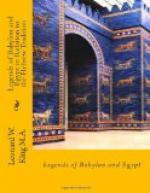(1) This suggestion is in some measure confirmed by the Biblical Antiquities of Philo, ascribed by Dr. James to the closing years of the first century A.D.; for its writer, in his account of the Flood, has actually used Ezek. xiv. 12 ff. in order to elaborate the divine speech in Gen. viii. 21 f. This will be seen from the following extract, in which the passage interpolated between verses 21 and 22 of Gen. viii is enclosed within brackets: “And God said: I will not again curse the earth for man’s sake, for the guise of man’s heart hath left off (sic) from his youth. And therefore I will not again destroy together all living as I have done. (But it shall be, when the dwellers upon earth have sinned, I will judge them by famine or by the sword or by fire or by pestilence (lit. death), and there shall be earthquakes, and they shall be scattered into places not inhabited (or, the places of their habitation shall be scattered). But I will not again spoil the earth with the water of a flood, and) in all the days of the earth seed time and harvest, cold and heat, summer and autumn, day and night shall not cease . . .”; see James, The Biblical Antiquities of Philo, p. 81, iii. 9. Here wild beasts are omitted, and fire, earthquakes, and exile are added; but famine, sword, and pestilence are prominent, and the whole passage is clearly suggested by Ezekiel. As a result of the combination, we have in the Biblical Antiquities a complete parallel to the passage in the Gilgamesh Epic.
It may of course be urged that wild beasts, famine, and pestilence are such obvious forms of divine punishment that their enumeration by both writers is merely due to chance. But the parallelism should be considered with the other possible points of connexion, namely, the fact that each writer is dealing with discrimination in divine punishments of a wholesale character, and that while the one is inspired by the Babylonian tradition of the Flood, the other takes the hero of the Hebrew Flood story as the first of his selected types of righteousness. It is possible that Ezekiel may have heard the Babylonian Version recited after his arrival on the Chebar. And assuming that some form of the story had long been a cherished tradition of the Hebrews themselves, we could understand his intense interest in finding it confirmed by the Babylonians, who would show him where their Flood had taken place. To a man of his temperament, the one passage in the Babylonian poem that would have made a special appeal would have been that quoted above, where the poet urges that divine vengeance should be combined with mercy, and that all, righteous and wicked alike, should not again be destroyed. A problem continually in Ezekiel’s thoughts was this very question of wholesale divine punishment, as exemplified in the case of Judah; and it would not have been unlikely that the literary structure of the Babylonian extract may have influenced the form in which he embodied his own conclusions.




